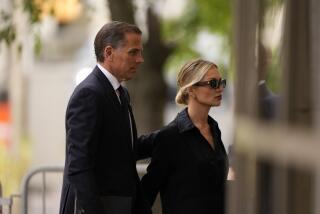Libby team skirted conspiracy idea
- Share via
WASHINGTON — In his opening statement three weeks ago in the federal perjury trial of I. Lewis “Scooter” Libby, defense lawyer Theodore V. Wells Jr. dropped a bombshell. In dramatic tones, Wells declared that Libby had been the victim of a White House conspiracy to make Libby the fall guy for the CIA leak scandal.
But when the jury begins deliberating the fate of the former vice presidential aide next week, it will have seen virtually no evidence to back up the provocative claim.
The difference between what Wells promised and delivered, and how it will play with the 12-member panel, is just one of the wild cards as the trial winds up. Libby himself did not take the stand, and the unusually spare defense seemed built on the hope that prosecutors did not make their case.
Indeed, the case is hardly a slam-dunk for the government. The defense punched some holes in the stories and memories of government witnesses, including journalists.
The biggest worry for the prosecution may be whether the jury will think it fair to convict Libby, the only person charged in the three-year federal probe, when he was neither the first nor the only high-level government official to talk about CIA operative Valerie Plame.
Libby is charged with attempting to conceal his involvement in the events that led up to the disclosure of Plame’s identity in published reports in the summer of 2003. Plame, a CIA arms-proliferation analyst, is married to Bush administration critic Joseph C. Wilson IV. The New York Times published a scathing anti-administration op-ed article by Wilson in July 2003, and eight days later his wife’s identity was exposed by syndicated columnist Robert Novak.
Testimony at the trial indicated that Libby and several other administration officials were discussing Plame with journalists, offering up her identity to explain Wilson’s CIA-directed trip to Africa, which turned up evidence that contradicted administration claims about Iraq’s nuclear intentions.
Libby denied to a federal grand jury that he knew about Wilson’s wife, but conceded that at one point he had heard it from a journalist, and then passed along the information as gossip.
The government said that he was lying, and that he had fabricated a story after realizing he may have disclosed classified information.
Special Prosecutor Patrick J. Fitzgerald’s parade of witnesses gave testimony indicating that Libby had come to know about Plame through a number of official sources, including Vice President Dick Cheney, well before he said he learned about her from a reporter. The government also called three journalists who spoke with Libby and who all disputed the version of conversations about Plame that Libby offered investigators.
By comparison, the defense that Wells offered was short and uneventful; the most provocative move was the decision not to call Libby to the witness stand.
His lawyers argued that if Libby misspoke to anyone, it was because he was swamped at work, essentially doing double duty as Cheney’s chief of staff and national security advisor. His former right-hand man testified that Libby was a workaholic who was constantly dealing with life-and-death issues.
Many experts believe the jury wanted to hear that from the defendant himself, and that they will question why he chose to stay mum.
“This is a case that cries out for Libby to take the stand,” said Jeffrey Frederick, a Charlottesville, Va., jury consultant. Under the law, the jury is not supposed to consider the fact that Libby did not testify in weighing his guilt or innocence. “Still, a number of jurors will be disappointed,” he said.
But some lawyers said the move made sense. If Libby had taken the stand, Fitzgerald would have launched a far-reaching attack on his credibility.
“He stood the risk of being branded a liar,” said John Hueston, a Los Angeles lawyer and former federal prosecutor who helped convict former Enron chief executive Kenneth L. Lay.
Hueston said the Lay case was an object lesson in why lawyers should think hard before subjecting their clients to cross-examination; Lay was quickly exposed as duplicitous.
Hueston said he thought that in Libby’s case, “the defense made a sensible move in not risking everything.”
How Wells will handle the once-jarring conspiracy theory is unclear.
In his opening statement, the lawyer produced a note from Cheney expressing concerns that Libby was being “sacrificed” and being put through “the meat grinder.” The theory was that the White House was angling to protect political strategist Karl Rove and dispense with Libby -- a theory that cast Libby in a sympathetic light.
But the conspiracy theory never really took root in court. Libby’s lawyers never called Cheney or Rove to explore the theory.
Fitzgerald attacked the scapegoat theory by introducing videotape of former White House Press Secretary Scott McClellan, who it was insinuated was part of the alleged anti-Libby cabal, publicly clearing Libby of any wrongdoing. The defense did not call McClellan either.
Legal experts said Wells could deal with the dropped conspiracy claim during his closing statement Tuesday by saying that the defense strategy changed because the lawyers thought the government case was so weak that it did not have to be addressed.
But lawyers said failing to follow up such a dramatic claim with harder evidence could backfire. Undelivered promises can raise questions in jurors’ minds about other defense claims.
“It gives the government an opportunity during closing arguments to cast doubt on the entire defense case,” said Daniel French, a former U.S. attorney. Fitzgerald, he said, “is now free to say ... ‘You didn’t hear about a conspiracy because it did not happen.’ ”
More to Read
Sign up for Essential California
The most important California stories and recommendations in your inbox every morning.
You may occasionally receive promotional content from the Los Angeles Times.










